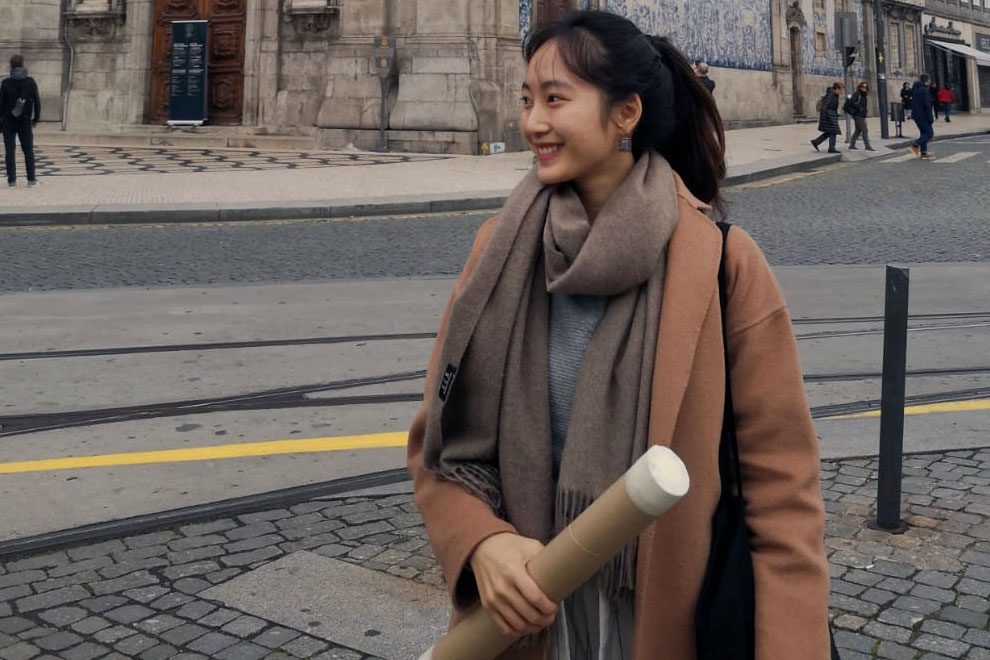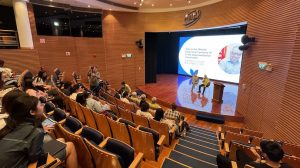For many people, waking up in a whitewashed building in a historic neighbourhood criss-crossed with cobbled streets, walking to work alongside churches that are hundreds of years old, and spending free time at a public square dotted with ancient statues and fringed by modern cafes, is the kind of life that exists only in dreams.
But this was a daily routine for Ms. Erato Li, an IFT Heritage Management graduate, when she spent 6 months in Évora, a city in Portugal that is home to a 13th-century Gothic cathedral and the remnants of several Roman buildings. She got the opportunity via an internship programme at the University of Évora, a partner institution of IFT. The programme ended in January.
Her love for heritage preservation led Ms. Li to the HERCULES Lab, a research facility at the University of Évora that is focused on the study of cultural heritage. There she was asked to create digital 3D models of museum artefacts, mainly bronze statues.
“I learnt a lot about 3D modelling and computing skills, which gave me a competitive edge for my future career,” Ms. Li says.
At 23, she is no stranger to Europe. She visited more than 10 countries there in 2016, while she was an exchange student in Finland during Year 2 of her studies at IFT. “I’ve always loved travelling, and IFT has opened the door to the world for me,” Ms. Li says.
Apart from assisting with technical work, Ms. Li thinks the experience of being a foreign intern at the HERCULES Lab helped in terms of her social development. “Unlike last time, in Finland, where everything was taken care of by my school, I had to figure things out by myself this time, from finding accommodation to setting up a bank account,” Ms. Li explains.
“Such experience strengthened my independence and resilience, not just in everyday life but also in the workplace. As most of my colleagues had a Ph.D. and were from different cultural backgrounds, how to work with them and to fit in was also a challenge.”
She succeeded in that. Thanks to her keenness to learn, Ms. Li even initiated a research project about exhibiting intangible heritage in a museum setting. She did so in collaboration with a like-minded co-worker whom she met at the laboratory.
Moving beyond ‘facadism’
Évora was designated in 1986 as a World Heritage Site by the United Nations Educational, Scientific and Cultural Organization (UNESCO). The settlement is a gateway to exploring Portugal’s past. The ancient city is a treasure store of Roman buildings and ruins, medieval monuments, Renaissance artefacts, and architecture in the baroque style.
“I was well entertained by simply walking around town as there were always many surprising discoveries along the way,” Ms. Li recalls.
“I was impressed by how well heritage is preserved in Évora, from the inside out, moving beyond facadism,” Ms. Li adds. That is a reference to the practice where only the façade of a building is preserved, with new structures erected behind it. “I visited an office where ancient building pillars and wall paintings co-existed with working desks; and a government building featuring an ancient Roman bath area in its lobby.”
Governmental support has been an integral part of the success enjoyed by Évora in the field of heritage preservation, she notes. Ms. Li says local officials welcome proposals from outside experts on heritage management, and are open to testing new approaches and new ways of problem-solving.
“One of my colleagues invented a cleaning process for statues using laser technology,” Ms. Li says. “The local government approved it to be tested on statues on the city’s cathedral.”
Ms. Li is now looking to further her studies on ethnology. She wants to focus her work on intangible heritage relating to her home province of Guangdong, including Cantonese, a speech dialect.
“Heritage is not only about buildings; it’s also about intangible values from language, to art, food and everyday life,” the IFT graduate points out.









